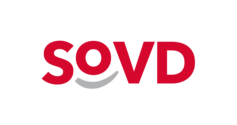Social Association Germany
| Social Association Germany (SoVD) |
|
|---|---|

|
|
| legal form | non-profit registered association |
| founding | 1917 |
| Seat | Berlin |
| precursor | Reich Association of War Disabled and War Participants |
| main emphasis | Social policy, social law |
| Chair | Adolf Bauer (President) |
| Members | 570,000 |
| Website | www.sovd.de |
The Social Association Germany e. V. ( SoVD ) is a socio-political interest group that campaigns for the strengthening of social rights. President of the SoVD is Adolf Bauer . He has held the office since October 15, 2003 and was elected by the delegates of the 21st Federal Association Conference on November 9, 2019 with a large majority to head the association for a further four years. Hannelore Buls (SoVD state association Lower Saxony) and Ursula Engelen-Kefer (SoVD state association Berlin-Brandenburg) as well as Jutta König (SoVD state association North Rhine-Westphalia) were elected vice-presidents .
Mission and goal
The association represents the interests of those with statutory pension insurance, those with statutory health insurance as well as those in need of care and people with disabilities vis-à-vis politics. The association advocates social justice and the maintenance and expansion of social security systems. The SoVD is non-profit and politically independent.
The association offers its members advice on social law in questions of statutory pension, health, long-term care, accident and unemployment insurance as well as in questions of disability law, basic security, unemployment benefit II and social assistance. The SoVD represents members in legal proceedings before the social courts and conducts model lawsuits on fundamental issues before the social courts.
numbers
The association has been based in Berlin since 2003 . 20,000 volunteers and around 700 full-time employees work for the SoVD nationwide. The SoVD is divided into around 3,000 regional, district and local associations. The total number of members is currently 560,000.
history

The association was founded in Berlin on May 23, 1917 under the name of the Association of War Participants and War Disabled, in order to enforce the pension claims of war victims of the First World War and their survivors for the first time . In 1918 it was renamed the Reich Association of War Disabled and War Participants . The social democratic politician Erich Kuttner was co-founder and chairman until 1919 . Together with the unionist Richard Heckmann, he is elected chairman with equal rights. The assessors are forward editor Ernst Heilmann and the Reichstag member Georg Davidsohn from the USPD . Many of the founding fathers, including Hugo Mengel , came from the labor movement and belonged to social democratic parties and trade unions. The Reichsbund was politically neutral. Since January 15, 1919 women can also become members. In 1922 the Reichsbund had 830,000 members. The later non-profit Reichsbund Housing and Settlement Society was founded on September 4, 1924. From 1924 to 1933 the head office is located on Stralsunder Straße in Berlin. With 100,000 members in 750 local groups, the association can help shape important social laws in the Weimar Republic, on which social legislation is still based today.
In the year power was transferred to the National Socialists, the Reichsbund resolved to dissolve its organization on April 29, 1933, because active resistance against Hitler's dictatorship was hopeless. With this step, the Reichsbund evaded the extensive alignment of politics, economy, culture, administration and associations. This decision enabled a credible new beginning in 1946, unencumbered by the past. On November 29, 1946, after the British occupying power's reservations about organizations for victims of war had been dispelled, the Social Association Reichsbund was brought into being in Hamburg and re-established on May 23, 1947. On January 4, 1964, the federal office was relocated from Hamburg to Bonn . In 1972 the "Youth in the Reichsbund", the youth association, is founded. On September 1, 1978, the Bremen vocational training center went into operation . On December 17, 1982, the Hotel Mondial opened on Kurfürstendamm in Berlin. On May 30, 1983, the workshop for the disabled opens in Witten.
In 1988 the association got into financial problems and a. also because of falsified membership numbers. According to the Federal Gazette, only about half of the 769,000 members were actually there. High membership figures also had an impact on the appointment of honorary judges at the Federal Social Court and the Broadcasting Council of the WDR , which were each occupied by a member of the Reichsbund. The long-time chairman Hermann Meyer resigned "for health reasons" and was succeeded by Hermann Salomonson. The board elections were temporarily blocked by the courts because the charitable status had to be checked. In contravention of the statutes, the Reichsbund provided funds for the construction of the association's own Mondial Hotel in West Berlin, which opened in December 1982. Their financing was supported by the State of Berlin and the Foundation Deutsche Klassenlotterie Berlin with 15.3 million DM . These made recourse claims because they were deceived about the liquidity of the association.
The Stendal vocational training center went into operation on September 9, 1991 . On November 9, 1995 the official short version of the Social Association Reichsbund eV was announced and on October 7, 1999 the name was changed to Sozialverband Deutschland eV On July 1, 2000 the federal office was relocated from Bonn to Berlin. In 2012 SoVD joined the Umfairteile alliance .
Association name
The socio-political and political changes are reflected in the changes in the association's name. The association was banned from 1933 to 1945. The association keeps an extensive archive, also on the predecessor organizations.
- In 1917 the association was founded in Berlin as a federation of war participants and war disabled.
- In 1919 it was renamed the Reich Association of War Disabled, War Participants and War Relatives .
- In 1946, the Reich Association of the Physically Damaged, Social Pensioners and Survivors was founded . Since the occupying powers rejected an organization of former soldiers to a large extent, a new name for the association was chosen.
- In 1949, after the founding of the Federal Republic of Germany, it renamed itself the Reich Association of War and Civil Disabled Persons, Social Pensioners and Survivors .
- In 1974 the Reichsbund took on the current socio-political terms in its name and now referred to itself as the Reichsbund of war victims, disabled people, social pensioners and surviving dependents .
- In 1987 the group of persons represented was completed in the name and was now called the Reich Association of Victims of War and Military Service, the Disabled, Social Pensioners and Survivors .
- In 1995 it was renamed the Social Association Reichsbund .
- In 1999, the new name was Sozialverband Deutschland (SoVD) with the addition of the former Reichsbund, founded in 1917 .
Association president since 1946
- 1946–1961: Paul Neumann
- 1961–1979: Rudolf Kleine
- 1979–1988: Hermann Meyer
- 1988–1990: Sophie Goetzke and Hermann Salomonson (both provisional)
- 1990–1996: Walter Franke
- 1997-2001: Hans Fiedler
- 2001–2003: Peter Vetter
- since October 15, 2003: Adolf Bauer
Facilities
SoVD operates recreation centers and hotels that are handicapped accessible.
In addition, the SoVD maintains two vocational training centers for disabled people in Bremen and Stendal and in this way contributes to ensuring that young people with disabilities receive qualified initial vocational training. The SoVD is also responsible for a workshop for disabled people in Witten.
SoVD is the sponsor of patient advice centers within the framework of the Independent Patient Advice Germany (UPD) . Patient advice is a model project and is available to all citizens free of charge.
meravis
The association also included the subsidiary meravis (“Mensch • raum • vision”) Wohnungsbau- und Immobilien GmbH, based at Krausenstrasse 46 in Hanover . This company was previously called the Reichsbund-Wohnungsbau-GmbH and before that the non-profit Reichsbund Wohnungsbau- und Siedlungsgesellschaft mbH (residential construction). In 1987 she made a profit of 8 million DM.
The housing association also fulfills a social mandate with the creation of housing suitable for the disabled and the elderly and the construction of apartments for large families as well as social institutions.
In April 2009, meravis took over the participation of the United Service Union ( ver.di ) in DAWAG (German employee housing company) with a property portfolio of around 6,000 units.
Member newspapers
- SoVD Zeitung - Social Issues at a Glance (= SoVD-Zeitung)
- SoVD magazine
literature
- Wolfgang Falk: From the Reichsbund to the Social Association Germany. Social Association Germany, Federal Association, Berlin 2017
Web links
Individual evidence
- ↑ Announcement of the public list of the registration of associations and their representatives. ( Memento of December 29, 2009 in the Internet Archive ) (PDF; 4.6 MB) Association entry no.1636
- ↑ Thomas Horsmann, Vorwärts, 5-6- / 2017, p. 33
- ↑ 100 years of the Social Association Germany: Self-help for war victims . In: forward . July 19, 2017 ( vorwaerts.de [accessed September 11, 2018]).
- ↑ Obviously faked . In: Der Spiegel . No. 2 , 1989, pp. 46, 49 ( online ).
- ^ Christian Weßling (editor): We . ( Memento from February 2, 2016 in the Internet Archive ) umverteilen.de; last accessed September 30, 2012
- ^ SoVD newspaper. SoVD, accessed June 18, 2017 .
- ^ SoVD magazine. SoVD, accessed June 18, 2017 .
- ↑ Literature by and about Social Association Germany in the catalog of the German National Library


